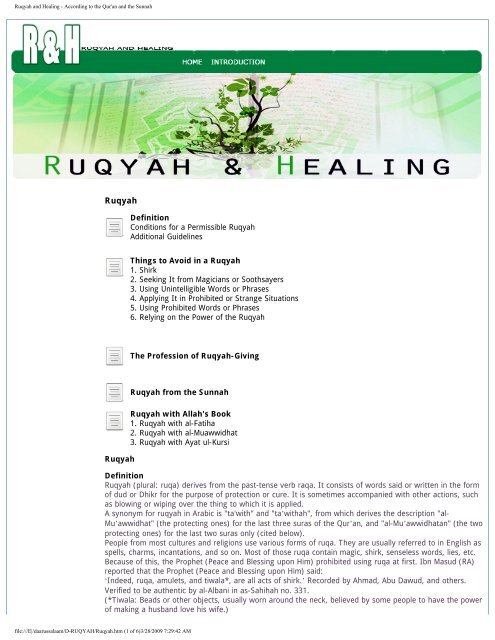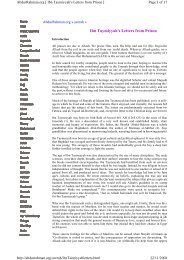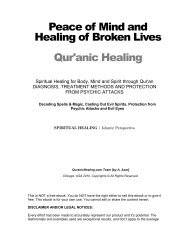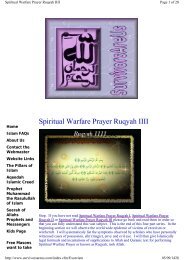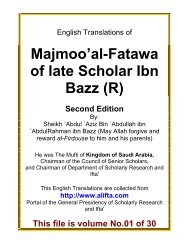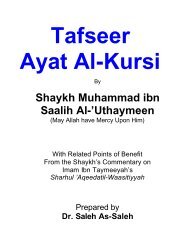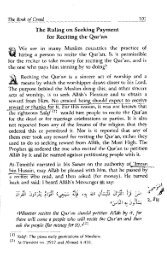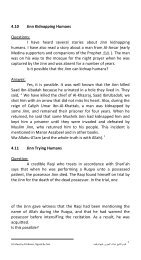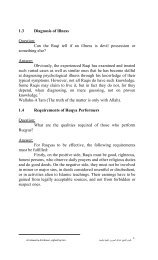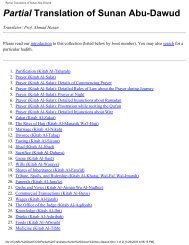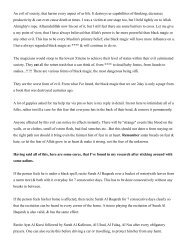Ruqyah and Healing - According to the Qur'an and the Sunnah
Ruqyah and Healing - According to the Qur'an and the Sunnah
Ruqyah and Healing - According to the Qur'an and the Sunnah
Create successful ePaper yourself
Turn your PDF publications into a flip-book with our unique Google optimized e-Paper software.
<strong>Ruqyah</strong> <strong>and</strong> <strong>Healing</strong> - <strong>According</strong> <strong>to</strong> <strong>the</strong> <strong>Qur'an</strong> <strong>and</strong> <strong>the</strong> <strong>Sunnah</strong>.<strong>Ruqyah</strong>DefinitionConditions for a Permissible <strong>Ruqyah</strong>Additional GuidelinesThings <strong>to</strong> Avoid in a <strong>Ruqyah</strong>1. Shirk2. Seeking It from Magicians or Soothsayers3. Using Unintelligible Words or Phrases4. Applying It in Prohibited or Strange Situations5. Using Prohibited Words or Phrases6. Relying on <strong>the</strong> Power of <strong>the</strong> <strong>Ruqyah</strong>The Profession of <strong>Ruqyah</strong>-Giving<strong>Ruqyah</strong> from <strong>the</strong> <strong>Sunnah</strong><strong>Ruqyah</strong><strong>Ruqyah</strong> with Allah's Book1. <strong>Ruqyah</strong> with al-Fatiha2. <strong>Ruqyah</strong> with al-Muawwidhat3. <strong>Ruqyah</strong> with Ayat ul-KursiDefinition<strong>Ruqyah</strong> (plural: ruqa) derives from <strong>the</strong> past-tense verb raqa. It consists of words said or written in <strong>the</strong> formof dud or Dhikr for <strong>the</strong> purpose of protection or cure. It is sometimes accompanied with o<strong>the</strong>r actions, suchas blowing or wiping over <strong>the</strong> thing <strong>to</strong> which it is applied.A synonym for ruqyah in Arabic is "ta'with" <strong>and</strong> "ta’withah", from which derives <strong>the</strong> description "al-Mu’awwidhat" (<strong>the</strong> protecting ones) for <strong>the</strong> last three suras of <strong>the</strong> Qur’an, <strong>and</strong> "al-Mu’awwidhatan" (<strong>the</strong> twoprotecting ones) for <strong>the</strong> last two suras only (cited below).People from most cultures <strong>and</strong> religions use various forms of ruqa. They are usually referred <strong>to</strong> in English asspells, charms, incantations, <strong>and</strong> so on. Most of those ruqa contain magic, shirk, senseless words, lies, etc.Because of this, <strong>the</strong> Prophet (Peace <strong>and</strong> Blessing upon Him) prohibited using ruqa at first. Ibn Masud (RA)reported that <strong>the</strong> Prophet (Peace <strong>and</strong> Blessing upon Him) said:‘Indeed, ruqa, amulets, <strong>and</strong> tiwala*, are all acts of shirk.’ Recorded by Ahmad, Abu Dawud, <strong>and</strong> o<strong>the</strong>rs.Verified <strong>to</strong> be au<strong>the</strong>ntic by al-Albani in as-Sahihah no. 331.(*Tiwala: Beads or o<strong>the</strong>r objects, usually worn around <strong>the</strong> neck, believed by some people <strong>to</strong> have <strong>the</strong> powerof making a husb<strong>and</strong> love his wife.)file:///E|/daarussalaam/D-RUQYAH/<strong>Ruqyah</strong>.htm (1 of 6)3/28/2009 7:29:42 AM
<strong>Ruqyah</strong> <strong>and</strong> <strong>Healing</strong> - <strong>According</strong> <strong>to</strong> <strong>the</strong> <strong>Qur'an</strong> <strong>and</strong> <strong>the</strong> <strong>Sunnah</strong>Later on, he (Peace <strong>and</strong> Blessing upon Him) allowed people <strong>to</strong> use only <strong>the</strong> ruqa that he approved, or thatdid not contain shirk. Jabir Bin 'Abdillah (RA) reported that Allah's Messenger (Peace <strong>and</strong> Blessing upon Him)prohibited ruqa. Then, some people from <strong>the</strong> tribe of 'Umr Bin Hazam came <strong>to</strong> him <strong>and</strong> said, "We have aruqyah that we used <strong>to</strong> use for scorpion <strong>and</strong> snake stings; but you have now prohibited using ruqa." And<strong>the</strong>y showed it <strong>to</strong> him. He (Peace <strong>and</strong> Blessing upon Him) said:‘I do not see anything wrong in it. Anyone among you who can benefit his bro<strong>the</strong>r should do so.’ MuslimConditions for a Permissible <strong>Ruqyah</strong>There are some important conditions that must be satisfied in a ruqyah <strong>to</strong> make it permissible. They weresummarized by Ibn Hajar (AR):"There is a consensus among <strong>the</strong> 'ulama that ruqa are permissible when <strong>the</strong>y satisfy three conditions:1 - To be with Allah's words or His names <strong>and</strong> attributes2 - To be in Arabic or of an intelligible meaning3 - And <strong>to</strong> believe that <strong>the</strong>y do not have effect by <strong>the</strong>mselves but by Allah ('Azza wa Jalla)." Fath ul Bari10/240In what follows, we discuss each of <strong>the</strong>se conditions:1. Must Be with Allah's Words, Names, or AttributesAs we will see below, all forms of ruqa reported in <strong>the</strong> <strong>Sunnah</strong> satisfy this condition. They ei<strong>the</strong>r consist ofspecific portions of <strong>the</strong> Qur’an, such as al-Fatiha or Ayat ul-Kursiy, or contain a praise of Allah ('Azza waJalla) <strong>and</strong> an invocation of His help <strong>and</strong> protection.2. Must Be with Clearly Unders<strong>to</strong>od WordsThis is an important condition that must be satisfied in order <strong>to</strong> eliminate any magic fac<strong>to</strong>rs from <strong>the</strong> ruqyah.3. Believing That <strong>the</strong> True Benefit Is from Allah ('Azza wa Jalla)Similar <strong>to</strong> our earlier discussion of medicines, one must always believe that <strong>the</strong> true <strong>and</strong> ultimate protec<strong>to</strong>r isAllah ('Azza wa Jalla) alone, <strong>and</strong> that ruqa <strong>and</strong> medications are means that He created <strong>and</strong> He controls as Hewills. Thus trust must be put in Him <strong>and</strong> not in <strong>the</strong> means that He created. Allah ('Azza wa Jalla) comm<strong>and</strong>sHis Messenger (Peace <strong>and</strong> Blessing upon Him):«So seek refuge with Allah (only); verily, it is He who is all-Hearer, all-Seer.» (Al Ghafir 40:56).Additional GuidelinesIn what follows, <strong>the</strong>re are additional guidelines that should be taken in<strong>to</strong> consideration what performing aruqyah.1. Adhering <strong>to</strong> What Is Reported in <strong>the</strong> <strong>Sunnah</strong><strong>Ruqyah</strong> is a form of supplication. As is <strong>the</strong> case with o<strong>the</strong>r supplications, it is permissible <strong>to</strong> use any wordsthat fulfill <strong>the</strong> above conditions. This is approved by Allah's Messenger (Peace <strong>and</strong> Blessing upon Him) whosaid:‘There is nothing wrong with ruqa as long as <strong>the</strong>y do not involve shirk.’ MuslimHowever, ra<strong>the</strong>r than experimenting with ruqa that may or may not be useful, <strong>and</strong> ra<strong>the</strong>r than beingdoubtful as <strong>to</strong> whe<strong>the</strong>r a specific ruqyah fulfills <strong>the</strong> correct conditions <strong>and</strong> guidelines, it is best <strong>to</strong> adhere <strong>to</strong><strong>the</strong> ruqa that have been reported in <strong>the</strong> <strong>Sunnah</strong>.Things <strong>to</strong> Avoid in a <strong>Ruqyah</strong>1. Shirk'Awf Bin Malik al-Ashja'i (RA) narrated that he said <strong>to</strong> <strong>the</strong> Prophet (Peace <strong>and</strong> Blessing upon Him), "O Allah'sMessenger! We used <strong>to</strong> apply ruqa during Jahiliyyah. What do you think of that?" He (Peace <strong>and</strong> Blessingupon Him) replied:‘Present your ruqa <strong>to</strong> me. There is nothing wrong with <strong>the</strong>m as long as <strong>the</strong>y do not involve shirk.’ MuslimIbn Mas’ud's wife Zaynab (RA) narrated that he saw on her neck a string <strong>and</strong> asked her, "What is this?" Shereplied, "It is a string on which a ruqyah was made for me." He cut it off her neck <strong>and</strong> said:"You, family of Ibn Mas’ud, are in no need for shirk. Truly, I heard Allah's Messenger (Peace <strong>and</strong> Blessingupon Him) say: ‘Indeed, ruqa, amulets, <strong>and</strong> tiwala, are all acts of shirk.’She said, "Why do you say this? I was having spasms of pain in my eye; so I went <strong>to</strong> such <strong>and</strong> such a Jewishman, <strong>and</strong> whenever he treated it with ruqyah, it soo<strong>the</strong>d it." He replied:"That is <strong>the</strong> doing of Satan. He (Satan) pinches it with his h<strong>and</strong>; <strong>and</strong> when <strong>the</strong> ruqyah is applied <strong>to</strong> it, heremoves his h<strong>and</strong>. It would have been sufficient for you <strong>to</strong> say what Allah's Messenger (Peace <strong>and</strong> Blessingupon Him) used <strong>to</strong> say:‘Athhib il-ba's, rabb an-nas, washfi ant ash-shafi, la shifa illa shifa uk, shifaan la yughadiru saqama.’file:///E|/daarussalaam/D-RUQYAH/<strong>Ruqyah</strong>.htm (2 of 6)3/28/2009 7:29:42 AM
<strong>Ruqyah</strong> <strong>and</strong> <strong>Healing</strong> - <strong>According</strong> <strong>to</strong> <strong>the</strong> <strong>Qur'an</strong> <strong>and</strong> <strong>the</strong> <strong>Sunnah</strong>Meaning: ‘Remove <strong>the</strong> affliction, Lord of <strong>the</strong> people, <strong>and</strong> cure - You are <strong>the</strong> one who cures, <strong>and</strong> <strong>the</strong>re is nocure except from You—a cure that will not leave any sickness.’ Recorded by Abu Dawud; judged hasan by al-Albani (Mishkat ul-Masabih no. 4552).The Prophet (Peace <strong>and</strong> Blessing upon Him) explicitly prohibited all magical ruqa. Jabir reported that <strong>the</strong>Prophet (Peace <strong>and</strong> Blessing upon Him) said:‘Nashrah* is of <strong>the</strong> doing of Satan.’ Recorded by Ahmad <strong>and</strong> Abu Dawud. Verified <strong>to</strong> be au<strong>the</strong>ntic by al-Albani (as-Sahihah no. 2760).(*A magical spell done <strong>to</strong> counter ano<strong>the</strong>r magical spell.)2. Seeking It from Magicians or SoothsayersOne may never go <strong>to</strong> a magician for help, regardless of whe<strong>the</strong>r <strong>the</strong> magician were true or false. Falsemagicians are liars who pretend things <strong>to</strong> attract people's awe, money, or both. True magicians rely on jinns<strong>and</strong> <strong>the</strong> devil, <strong>and</strong> apply procedures containing kufr <strong>to</strong> produce <strong>the</strong>ir spells. Thus all of <strong>the</strong>ir spells, includingruqa, are prohibited, <strong>and</strong> any Muslim who seeks <strong>the</strong>ir help belies his belief in <strong>the</strong> Prophet (Peace <strong>and</strong>Blessing upon Him). Abu Hurayrah (RA) reported that <strong>the</strong> Prophet (Peace <strong>and</strong> Blessing upon Him) said:‘Whoever goes <strong>to</strong> a soothsayer or fortuneteller <strong>and</strong> believes in what he says has indeed rejected that whichhas been revealed <strong>to</strong> Muhammad.’ Recorded by Ahmad <strong>and</strong> al-Hakim. Verified <strong>to</strong> be au<strong>the</strong>ntic by al-Albani(Sahih ul-Jami no. 5939).As indicated in <strong>the</strong> Qur’an, (<strong>the</strong> magicians can never be successful) (Taha 20:69), nor (can <strong>the</strong>y benefitanyone) (al-Baqarah 2:102). Because of all of this, <strong>and</strong> from <strong>the</strong> rule established earlier that Allah did notmake our cure in anything that He prohibited, we clearly conclude that it is not permissible at all <strong>to</strong> seek aruqyah from a magician.3. Using Unintelligible Words or PhrasesAs has been indicated earlier, a ruqyah must be in intelligible <strong>and</strong> well-underst<strong>and</strong>able words. O<strong>the</strong>rwise, itcould contain shirk, magic, or o<strong>the</strong>r evils covered by cryptic characters <strong>and</strong> mysterious words.4. Applying It in Prohibited or Strange SituationsSome people require that a ruqyah be accompanied with bizarre actions or conditions, such as applying it ina graveyard or bathroom, or applying it <strong>to</strong> a person who is unclean or covered with najasah. These <strong>and</strong>o<strong>the</strong>r similar requirements, beside conflicting with what has been reported in <strong>the</strong> <strong>Sunnah</strong>, demonstrate adevilish tendency that must be <strong>to</strong>tally avoided.As for writing a ruqyah on a piece of paper <strong>and</strong> attaching it <strong>to</strong> <strong>the</strong> body of <strong>the</strong> patient, or soaking <strong>the</strong> paperin water <strong>and</strong> making him drink that water, or blowing <strong>and</strong> spitting over a water container while reading it<strong>and</strong> <strong>the</strong>n making him drink that water, all of this has no basis in <strong>the</strong> <strong>Sunnah</strong> (There are some au<strong>the</strong>nticreports indicating that Imam Ahmad (AR) <strong>and</strong> some o<strong>the</strong>r 'ulama of <strong>the</strong> salaf have allowed some of <strong>the</strong>seactions, but this by no means gives <strong>the</strong>m a stamp of approval without a supportive evidence from <strong>the</strong><strong>Sunnah</strong>.), <strong>and</strong> should <strong>the</strong>refore be <strong>to</strong>tally avoided.5. Using Prohibited Words or PhrasesA ruqyah may not include evil words, such as cursing, offensive descriptions, or profanity. All of this isprohibited, <strong>and</strong>, as has been indicated earlier, Allah did not make our cure in anything prohibited.6. Relying on <strong>the</strong> Power of <strong>the</strong> <strong>Ruqyah</strong>Nei<strong>the</strong>r <strong>the</strong> person applying a ruqyah, nor <strong>the</strong> person <strong>to</strong> whom it is applied may assume that it has anindependent power of cure or protection. They must both put <strong>the</strong>ir full trust in Allah, rely fully on Him, <strong>and</strong>believe that <strong>the</strong> ruqyah is a means that He created for <strong>the</strong>m. As Ibn Al-Qayyim indicates (Al Jawab Al Kafi),one should view a ruqyah like one does a sword: it can be of no use without three conditions:a) It should be strong <strong>and</strong> sharp.b) The person using it should be well versed <strong>and</strong> experienced.c) There should be no obstacles hindering it from being most effective.The Profession of <strong>Ruqyah</strong>-GivingSome people have turned ruqyah-giving in<strong>to</strong> a profession for which <strong>the</strong>y devote <strong>the</strong>ir full time, <strong>and</strong> fromwhich <strong>the</strong>y earn a lot of money. This conflicts with <strong>the</strong> <strong>Sunnah</strong> <strong>and</strong> <strong>the</strong> practice of <strong>the</strong> salaf. It should beavoided by both <strong>the</strong> giver (called a reciter or a raqi) <strong>and</strong> <strong>the</strong> seeker of ruqyah. Some of <strong>the</strong> reasons for itsprohibition are <strong>the</strong> following:1. The common people think that <strong>the</strong> reciter has a special healing power, <strong>the</strong>reby turning <strong>the</strong>ir minds from<strong>the</strong> True Healer <strong>and</strong> His words <strong>to</strong> <strong>the</strong> one who recites <strong>the</strong>m. This is a clear source of shirk.2. We have no reports of any of <strong>the</strong> sahabah <strong>and</strong> salaf devoting <strong>the</strong>ir time <strong>to</strong> offer this service. This makes ita bid’ah in <strong>the</strong> Din.file:///E|/daarussalaam/D-RUQYAH/<strong>Ruqyah</strong>.htm (3 of 6)3/28/2009 7:29:42 AM
<strong>Ruqyah</strong> <strong>and</strong> <strong>Healing</strong> - <strong>According</strong> <strong>to</strong> <strong>the</strong> <strong>Qur'an</strong> <strong>and</strong> <strong>the</strong> <strong>Sunnah</strong>3. When <strong>the</strong> devils realize <strong>the</strong> common people's fascination by a particular person, <strong>the</strong>y do things <strong>to</strong> causedeviation <strong>to</strong> him <strong>and</strong> <strong>the</strong>m. This is clearly expressed in <strong>the</strong> above discussion that <strong>to</strong>ok place between IbnMas’ud <strong>and</strong> his wife.4. When a reciter finds <strong>the</strong> people ga<strong>the</strong>ring at his door seeking his help, he would imagine that he has ahigh status before Allah, <strong>and</strong> would be drawn in<strong>to</strong> vanity <strong>and</strong> conceit.5. Most of <strong>the</strong> reciters have a poor knowledge of <strong>the</strong> <strong>Sunnah</strong>, which makes <strong>the</strong>m claim or do things thathave no basis in Islam.6. Since this profession is a good source of income, it attracts many impos<strong>to</strong>rs <strong>and</strong> liars who claim that <strong>the</strong>ycan treat people, <strong>the</strong>reby adding <strong>to</strong> <strong>the</strong> spread of ignorance, falsehood, <strong>and</strong> shirk.Ruqa from <strong>the</strong> <strong>Sunnah</strong>Various forms of supplications for prevention or healing, some of which may be classified as ruqa, have beenpresented in this site. In what follows, we include some more, or refer <strong>to</strong> earlier ones, as <strong>the</strong> discussionwarrants.<strong>Ruqyah</strong> with Allah's NameAbu Sa’id al-Khudri (RA) reported that Jibril came <strong>to</strong> <strong>the</strong> Prophet (Peace <strong>and</strong> Blessing upon Him) <strong>and</strong> said:,"O Muhammad, are you sick?" He replied, ‘Yes.’ He said:"Bismillahi arqik, min kulli shayin yuthik, min sharri kulli nafsin aw ayni hasid - With Allah's Name I shelteryou (give you ruqyah), from all that ails you, from <strong>the</strong> evil of every soul, or that of <strong>the</strong> envious eyes. MayAllah cure you; with Allah's Name I shelter you." Muslim <strong>and</strong> o<strong>the</strong>rs.<strong>Ruqyah</strong> with Allah's Book'Aishah (RA) reported that Allah's Messenger (Peace <strong>and</strong> Blessing upon Him) came in<strong>to</strong> her house <strong>and</strong> sawwith her a woman who was treating her with ruqyah. He <strong>to</strong>ld her:‘Treat her (only) with Allah's Book.’ Recorded by Ibn Hibban; verified <strong>to</strong> be au<strong>the</strong>ntic by al-Albani in as-Sahihah no. 1931.In what follows, we present ruqa with specific suras or ayat as is recorded in <strong>the</strong> <strong>Sunnah</strong>.1. <strong>Ruqyah</strong> with al-FatihaAbu Sa’id al-Khudri <strong>and</strong> Ibn Abbas (RA) reported that a number of <strong>the</strong> Prophet's (Peace <strong>and</strong> Blessing uponHim) companions were on a journey. They s<strong>to</strong>pped one night by <strong>the</strong> dwellings of a bedouin tribe whorefused <strong>to</strong> host <strong>the</strong>m <strong>and</strong> give <strong>the</strong>m food.The chief of that tribe was <strong>the</strong>n stung (by a snake or scorpion). His people tried everything possible <strong>to</strong> treathim, but <strong>to</strong> no avail. One of <strong>the</strong>m suggested <strong>to</strong> seek help from <strong>the</strong> travellers. When <strong>the</strong>y came <strong>to</strong> <strong>the</strong>m, oneof <strong>the</strong>m said, "By Allah, I can perform ruqyah; but you have refused <strong>to</strong> host us. So I would not perform <strong>the</strong>ruqyah until you pledge <strong>to</strong> give us an offering."They agreed <strong>to</strong> give <strong>the</strong>m a flock of thirty sheep, <strong>and</strong> <strong>the</strong> companion started blowing (with light spit) on <strong>the</strong>stung man's sting <strong>and</strong> reading al-Fatiha. He was immediately cured, like one who was tied <strong>and</strong> <strong>the</strong>n set free.He s<strong>to</strong>od <strong>and</strong> walked as if nothing happened <strong>to</strong> him, <strong>and</strong> <strong>the</strong>y gave <strong>the</strong>m <strong>the</strong>ir pledged offering.Some of <strong>the</strong> companions said, "Let us divide this flock among us." O<strong>the</strong>rs said, "No, you may not take anypay for reading Allah's Book! Let us not divide <strong>the</strong> goats until we reach <strong>the</strong> Prophet (Peace <strong>and</strong> Blessingupon Him), tell him what happened, <strong>and</strong> see what he comm<strong>and</strong>s us."When <strong>the</strong>y reached al-Madinah, <strong>the</strong>y came <strong>to</strong> <strong>the</strong> Prophet (Peace <strong>and</strong> Blessing upon Him) <strong>and</strong> <strong>to</strong>ld him whathappened. He said (approvingly):‘How did you know that it (al-Fatiha) is a ruqyah? You have done well! And indeed, <strong>the</strong> best thing <strong>to</strong> be paidfor is Allah's Book*. So, divide it among you; <strong>and</strong> allot a share for me.’ Al-Bukhari, Muslim, <strong>and</strong> o<strong>the</strong>rs.(*One may not be paid for praying or reading Qur’an, because <strong>the</strong>se are acts of worship that should be donepurely for Allah ('Azza wa Jalla). However, it is permissible <strong>to</strong> be paid a compensation for <strong>the</strong> time or effortthat one sometimes puts in<strong>to</strong> matters associated with <strong>the</strong>se acts of worship in order <strong>to</strong> serve <strong>the</strong> Muslimcommunity. For example, a regular imam in a masjid should be compensated for devoting his time <strong>to</strong> thatposition, o<strong>the</strong>rwise he would have <strong>to</strong> work in a profession that would prevent him from fulfilling all of <strong>the</strong>services needed from him. Fur<strong>the</strong>rmore, based on this hadith, some scholars conclude that it is alsopermissible <strong>to</strong> be paid for a benefit that reaches o<strong>the</strong>rs because of one's reading Qur’an.)2. <strong>Ruqyah</strong> with al-MuawwidhatAs explained earlier, al-Muawwidhat are <strong>the</strong> last three suras of <strong>the</strong> Qur’an. The last two of <strong>the</strong>m carry a clearmeaning of ruqyah, <strong>and</strong> are presented below. Surat ul-Ikhlas (112) does not carry such meaning in anexplicit manner, but contains concise <strong>and</strong> strong words of praise for Allah ('Azza wa Jalla), making it anfile:///E|/daarussalaam/D-RUQYAH/<strong>Ruqyah</strong>.htm (4 of 6)3/28/2009 7:29:42 AM
<strong>Ruqyah</strong> <strong>and</strong> <strong>Healing</strong> - <strong>According</strong> <strong>to</strong> <strong>the</strong> <strong>Qur'an</strong> <strong>and</strong> <strong>the</strong> <strong>Sunnah</strong>important introduction <strong>to</strong> <strong>the</strong> succeeding two suras:(Say, "I seek refuge with <strong>the</strong> Lord of daybreak, from <strong>the</strong> evil of what he created, <strong>and</strong> from <strong>the</strong> evil ofdarkness when it settles, <strong>and</strong> from <strong>the</strong> evil of <strong>the</strong> blowers in knots, <strong>and</strong> from <strong>the</strong> evil of an envier when heenvies.") 113(Say, "I seek refuge with <strong>the</strong> Lord of <strong>the</strong> people, <strong>the</strong> King of <strong>the</strong> people, <strong>the</strong> God of <strong>the</strong> people, from <strong>the</strong> evilof a retreating whisperer, who whispers (evil) in <strong>the</strong> breasts of <strong>the</strong> people, (whe<strong>the</strong>r he is) from among jinnsor <strong>the</strong> people.") 114‘Aishah (RA) reported:"When Allah's Messenger (Peace <strong>and</strong> Blessing upon Him) went <strong>to</strong> bed, he would bring <strong>the</strong> palms of bothh<strong>and</strong>s <strong>to</strong>ge<strong>the</strong>r, <strong>and</strong> blow in<strong>to</strong> <strong>the</strong>m while reading "Qul huwa Allahu ahad" 112, "Qul a’udhu bi rabb il-falaq"113, "Qul a’udhu bi rabbi n-Nas" 114. He would <strong>the</strong>n rub with <strong>the</strong>m whatever he could reach of his body,starting with his head, face, <strong>and</strong> <strong>the</strong> front part of his body. He would do this three times. When he got veryill, he asked me <strong>to</strong> do that for him." Al Bukhari <strong>and</strong> Muslim‘Aishah (RA) also reported:"In <strong>the</strong> final sickness in which he passed away, <strong>the</strong> Prophet (Peace <strong>and</strong> Blessing upon Him) used <strong>to</strong> blowover himself with al-Mu’awwidhat. When he became very ill, I blew with <strong>the</strong>m for him, rubbing over him withhis own h<strong>and</strong> because of <strong>the</strong> blessing in it." Al Bukhari <strong>and</strong> MuslimWe can use <strong>the</strong>se suras for scorpion stings like it as been reported in ahadith.3. <strong>Ruqyah</strong> with Ayat ul-KursiUbayy Bin Ka'b narrated that he had a harvest of dates. He noticed that it shrunk every day, <strong>and</strong> decided <strong>to</strong>watch it at night. He did <strong>and</strong> noticed a beast that looked like a boy who attained puberty. He gave himsalam, <strong>and</strong> it responded <strong>to</strong> him with salam.He asked it, "Are you human or jinn"It replied, "Jinn."He <strong>to</strong>ld it, "Show me your h<strong>and</strong>."It showed him its h<strong>and</strong>, <strong>and</strong> he saw that it looked like a dog's, with fur like that of a dog covering it. Heexclaimed, "Is this how jinn are like!?" It <strong>the</strong>n <strong>to</strong>ld him, "All jinns know that <strong>the</strong>re is no one among <strong>the</strong>mstronger than me." He asked it, "What brought you here?" It replied, "We have been informed that you like<strong>to</strong> give charity, so we came <strong>to</strong> get some of your food." He asked it, "What would protect us from you?" Itreplied, "This ayah from Surat ul-Baqarah: (Allahu la ilaha illa huwa Al-Hayy ul-Qayyum,) (2/255) - whoeversays it in <strong>the</strong>evening will be protected from us until <strong>the</strong> morning, <strong>and</strong> whoever says it in <strong>the</strong> morning will be protectedfrom us until <strong>the</strong> evening."In <strong>the</strong> morning, Ubayy came <strong>to</strong> Allah's Messenger (Peace <strong>and</strong> Blessing upon Him) <strong>and</strong> <strong>to</strong>ld him of thatincident. He <strong>to</strong>ld him, ‘The evil one has said <strong>the</strong> truth!’ Recorded by an-Nasa i <strong>and</strong> o<strong>the</strong>rs. Verified <strong>to</strong> beau<strong>the</strong>ntic by al-Albani.TOPMuhammad Al JibalySickness: Regulations & ExhortationsPart 1file:///E|/daarussalaam/D-RUQYAH/<strong>Ruqyah</strong>.htm (5 of 6)3/28/2009 7:29:42 AM
<strong>Ruqyah</strong> <strong>and</strong> <strong>Healing</strong> - <strong>According</strong> <strong>to</strong> <strong>the</strong> <strong>Qur'an</strong> <strong>and</strong> <strong>the</strong> <strong>Sunnah</strong>2008 © <strong>Ruqyah</strong> <strong>and</strong> <strong>Healing</strong>file:///E|/daarussalaam/D-RUQYAH/<strong>Ruqyah</strong>.htm (6 of 6)3/28/2009 7:29:42 AM


